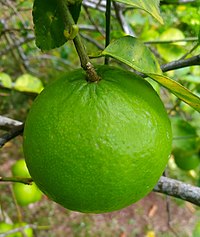
Photo from wikipedia
Abstract Mexico is the world’s leading Persian lime (Citrus latifolia T.) fruit producer and exporter. The use of rootstocks in citrus may increase fruit quality; however, the most used rootstock… Click to show full abstract
Abstract Mexico is the world’s leading Persian lime (Citrus latifolia T.) fruit producer and exporter. The use of rootstocks in citrus may increase fruit quality; however, the most used rootstock in Mexico is Sour orange, which is susceptible to the citrus tristeza virus. The objetive of this work was to evaluate the effect of rootstock (Sour orange, Volkamerian lemon, Flying dragon, Swingle citrumelo and C-35 citrange) on Persian lime fruit quality parameters. Peel thickness, juice content, pH, total titratable acidity (TA), total soluble solids (TSS), weight loss, pectin content, organic acids, sugars and characterization of essential oil components were evaluated. The use of rootstocks had no effect on juice content, pH, TA, organic acids (oxalic, malic and ascorbic) and sugars content (fructose, glucose and sucrose). Fruits from trees grafted on Sour orange and Volkamerian lemon showed the highest pectin yield, while Volkamerian lemon and Flying dragon showed the highest content of citric acid. The aromatic profile of Persian lime essential oil was affected by rootstock type. Fruits from trees grafted on Flying dragon showed a darker and more intense green color, the highest values of TSS and lower percentage of weight loss.
Journal Title: Scientia Horticulturae
Year Published: 2019
Link to full text (if available)
Share on Social Media: Sign Up to like & get
recommendations!